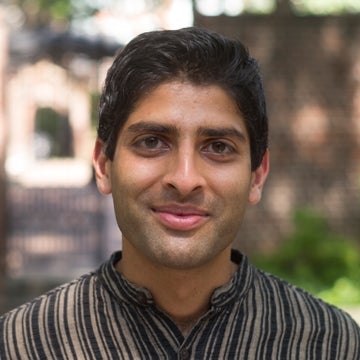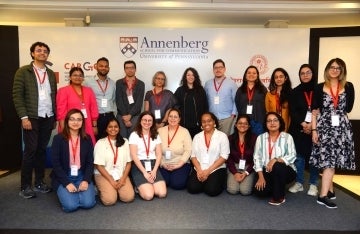Annenberg Doctoral Students Pursue Joint Degrees in Political Science, Law, and Social Welfare
The Annenberg School and the University of Pennsylvania value interdisciplinary scholarship.

Photo Credit: Scott Spitzer / University of Pennsylvania
Using neuroscience to investigate the effect of political humor on behavior. Incorporating artistic practice into the study of data collection. Combining environmental studies with sociology and communication to develop visual calls to action regarding climate change.
These are just a few examples of the interesting and innovative work Annenberg graduate students do. Because the Annenberg School is committed to interdisciplinary scholarship and aims to create an environment that enables and empowers students to pursue research that draws on multiple disciplines, students are able to engage in projects they wouldn’t otherwise do.
The University of Pennsylvania also values interdisciplinary scholarship, and many students — both graduate and undergraduate — take advantage of this by completing degrees from multiple disciplines simultaneously. Annenberg students are no exception.

Many Annenberg graduate students are interested in political communication and much of their work draws from and overlaps with political science. After hiring Professor Diana Mutz, who holds a joint appointment at the Annenberg School and in Penn’s Political Science department, a formal agreement was reached to allow students to pursue joint doctoral degrees in communication and political science.
The first student to complete a joint degree through the collaboration between Annenberg and Political Science was Emily Thorson (Ph.D. ’13). Since then, two other students have graduated with the joint degree and five current students are pursuing it. One of these is Eunji Kim, who is slated to graduate next month, and has already been offered a tenure-track position at Vanderbilt University.
Hye-Yon Lee, a fifth year doctoral student, sees many advantages to pursuing the joint degree, including the potential of expanded job opportunities upon graduation. The biggest benefit she sees, though, is access to two sets of world-renowned faculty.
“I’m not just taking classes from a different department,” Lee says, “I’m actually part of two departments. Both Annenberg faculty and Political Science faculty consider me their student, and that offers a lot of opportunities to interact with and learn from experts in both fields.”

Joanne Murray, Assistant Dean for Graduate Studies, works hard to accommodate student interest, collaborating with other departments to develop plans of study for those pursuing joint degrees. While the arrangements have been less formalized than the relationship between Annenberg and Political Science, Annenberg students have pursued joint degrees in other fields over the years, including History, Education, and Social Work.
Melissa Skolnick-Noguera, currently a third year social welfare Ph.D. student at the School of Social Policy and Practice (SP2), has been accepted into a joint degree program and will begin at Annenberg in the fall semester. With a long history of creative nonprofit work on her resume, she’s interested in studying how media and communications methods, particularly video, can be harnessed for social justice.
“I see the joint degree as an exchange of ideas,” says Skolnick-Noguera. “Collaborating and having conversations with students and faculty in both schools, as well as with intersecting community-based projects in Philadelphia and beyond.”
At SP2, she can bring a communications lens into the conversation, showing her social work colleagues how their field might benefit from visual and artistic methods. At Annenberg, she can use her social work background to help answer questions of how people are impacted by and can transform various types of communication.

Although it may not seem like it at first glance, the field of Communication and law have a lot of overlap, and several Penn faculty members hold appointments at both Annenberg and Penn Law, including Professor Monroe Price. The study of media policy leans heavily on both disciplines, and an interest in this area is what brought about an option for students to earn both a J.D. and a Ph.D. at the same time.
Sanjay Jolly, currently a third year doctoral student at Annenberg and a first year student at Penn Law, has long been attracted to communication policy, media history, and freedom of expression. Wanting to have both an intellectual grounding in communication and media studies as well as the necessary training to practice law motivated his choice to pursue both degrees at once.
“I’m learning to integrate the theoretical framework of Communication with legal scholarship,” Jolly says. “The two disciplines use very different language, but I’m seeing that the same sets of issues are being talked about in both spaces. My understanding of the issues is more robust from having both perspectives.”
Professor Guobin Yang, Annenberg’s Associate Dean of Graduate Studies, agrees that Communication research benefits by learning from other disciplines.
“The faculty at the Annenberg School conduct research in numerous areas and with diverse methodologies, as do our graduate students,” says Yang, who holds appointments at Annenberg and in Penn’s Sociology department. “We are committed to supporting students as they pursue their scholarly interests, and we encourage them to learn from other disciplines. Offering joint degree opportunities is a logical extension of valuing interdisciplinary research.”



